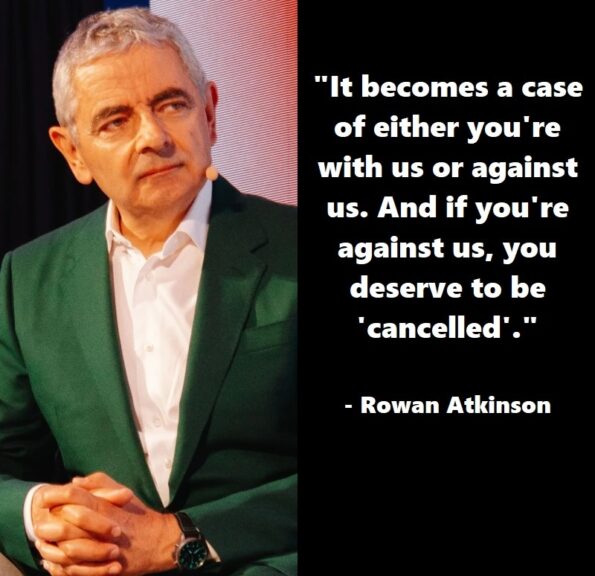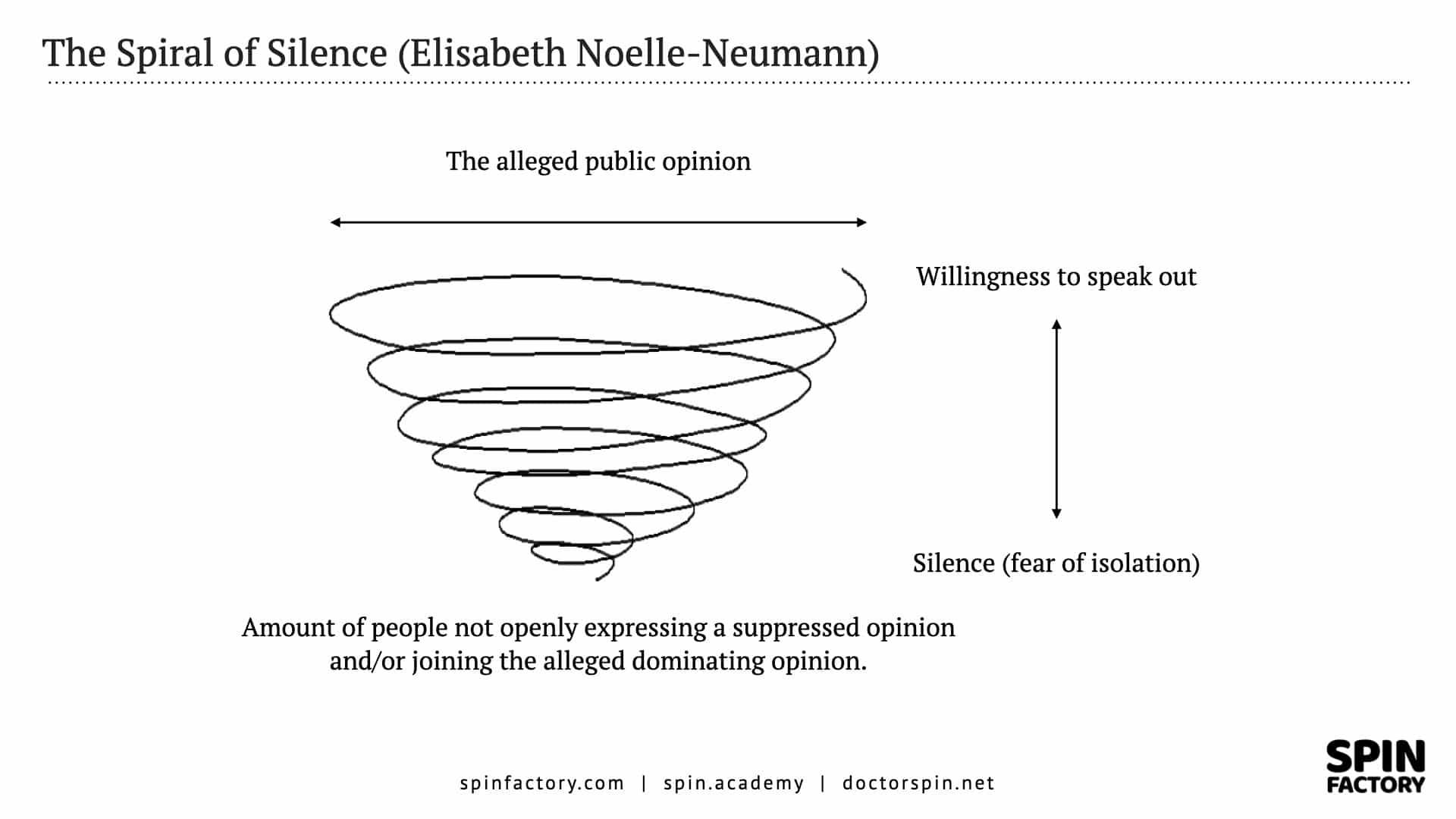Cancel culture is evil.
We celebrate diversity in the workplace, but we’ve ceased to encourage diversity in thoughts, opinions, or sense of humour.
I fear competence and experience will begin to matter less than having opinions that are en vogue.
Here we go:
Cancel Culture is Evil
What is cancel culture?
Cancel culture = the weaponisation of social outrage to silence, punish, and exile individuals or ideas rather than engaging with them in rational debate.
Cancel culture thrives on public shaming, digital mob justice, and eliminating nuance, reducing complex human beings to single statements or actions — often taken out of context or judged retroactively by evolving moral standards.
“Cancel culture or call-out culture is a phrase contemporary to the late 2010s and early 2020s used to refer to a form of ostracism in which someone is thrust out of social or professional circles — whether it be online, on social media, or in person. Those subject to this ostracism are said to have been ‘cancelled’.”
Source: Wikipedia 1Cancel culture. (2023, January 4). In Wikipedia. https://en.wikipedia.org/wiki/Cancel_culture
Conformity, Oppression, and Stagnation
Unlike traditional accountability, which allows for discussion, learning, and proportional consequences, cancel culture demands immediate and absolute destruction.
Historically, societies that have embraced ideological purges — whether in the form of book burnings, blacklists, or political witch hunts — have not led to progress but instead to oppression and intellectual stagnation. Cancel culture, while often disguised as activism, is fundamentally a modern form of authoritarian control, ensuring conformity not through reason but through intimidation.
In its most extreme form, cancel culture leads to collective amnesia, erasing people, books, films, and even historical figures from public life, as if uncomfortable realities can be scrubbed from existence.
What makes cancel culture particularly insidious is that it operates outside formal institutions, giving unaccountable digital mobs the power to act as judges, juries, and executioners.
The Terror of Being Next
“Cancel culture on social media is a form of public shaming that aims to diffuse public discourse and promote tolerance, but can also be viewed as a form of intolerance against opposing views.”
Source: Rupkatha Journal on Interdisciplinary Studies in Humanities 2Velasco, J. (2020). You are Cancelled: Virtual Collective Consciousness and the Emergence of Cancel Culture as Ideological Purging. Rupkatha Journal on Interdisciplinary Studies in Humanities, 12. … Continue reading
Cancel culture replaces conversation with coercion, creating a world where moral purity is performative and intellectual exploration is replaced by ideological conformity.
A society ruled by the fear of cancellation is not a free society — it is a social panopticon in which people are not guided by moral conviction but by the terror of being next.
It creates an atmosphere of fear (i.e. the spiral of silence), where people are afraid to express dissenting opinions, ask difficult questions, or challenge prevailing dogmas. This stifles creativity, intellectual diversity, and essential human interaction, as individuals constantly self-censor to avoid social annihilation.

How To Navigate Cancel Culture
The culture war with de-platforming, cancel culture, online lynch mobs, woke journalism, populism, fake news, and moral slacktivism are fast becoming our biggest challenges as PR professionals.
Here’s how to navigate cancel culture:
Learn more: Cancel Culture is Evil
De-Platforming as a Practice
Online lynch mobs sometimes force online moderators to de-platform individuals, partner organisations, advertisers, collaborators, etc.
“Deplatforming, also known as no-platforming, has been defined as an ‘attempt to boycott a group or individual through removing the platforms (such as speaking venues or websites) used to share information or ideas, or ‘the action or practice of preventing someone holding views regarded as unacceptable or offensive from contributing to a forum or debate, especially by blocking them on a particular website’.”
Source: Wikipedia 3Deplatforming. (2023, January 8). In Wikipedia. https://en.wikipedia.org/wiki/Deplatforming
Is de-platforming a sound practice?
The short answer is no.
From the aggressor’s perspective, you should never adhere to anti-democratic and authoritarian methods of silencing your enemies.
From the moderator’s perspective, you should always adhere to your publicly available policies and never make exceptions based on peer pressure from online lynch mobs.
From the defendant’s perspective, you should never take your freedoms for granted and enjoy your rights humbly and responsibly.
Learn more: De-Platforming as a Practice
The Lüth Ruling of 1958
The Lüth ruling (BVerfGE 7, 198) was a 1958 decision by the Federal Constitutional Court of Germany (Bundesverfassungsgericht) that became a foundational precedent for the interpretation of freedom of speech (Meinungsfreiheit) in post-war Germany. It established that fundamental rights (Grundrechte) are defensive rights against the state and influence private law, reinforcing freedom of expression as a core constitutional principle.
In 1950, Ernst Lüth, a journalist and former resistance fighter against the Nazi régime, publicly called for a boycott of a new film by Veit Harlan, a director infamous for making Jud Süß (1940), one of the most notorious pieces of Nazi propaganda. Harlan’s new film, Unsterbliche Geliebte (Immortal Beloved), was met with backlash because of his past role in spreading antisemitic ideology. 4Jud Süß. (2023, November 10). In Wikipedia. https://en.wikipedia.org/wiki/Jud_S%C3%BC%C3%9F
Lüth encouraged cinemas not to screen Harlan’s film, which led the producer to sue Lüth under civil law for causing economic harm to the film’s success. The Hamburg Regional Court ruled against Lüth and issued an injunction preventing him from calling for a boycott.
The case reached the Federal Constitutional Court, which had to determine whether freedom of speech, protected by Article 5 of the German Basic Law (Grundgesetz, GG), applied to disputes between private individuals or whether fundamental rights only applied to state actions.
In a groundbreaking ruling, the Federal Constitutional Court overturned the lower court’s decision and ruled in Lüth’s favor, establishing two crucial legal principles:
The Lüth ruling set a significant precedent in German constitutional law by establishing that fundamental rights influence all areas of law, including private disputes. This decision:
The Lüth ruling of 1958 remains one of the most cited and influential cases in German legal history, forming the foundation for Germany’s modern understanding of free speech and human rights law.
Learn more: The Lüth Ruling of 1958 (to be published)
Why Uncomfortable Opinions Matters
A democracy that values free speech must, by definition, tolerate and engage with uncomfortable opinions — even those that challenge its foundations.
Throughout history, the suppression of dissenting voices has often been the precursor to authoritarianism, while societies that embraced intellectual conflict flourished in innovation and self-correction.
The First Amendment in the United States, the Grundrechte (Basic Rights) in Germany, and the European Convention on Human Rights (Article 10) all enshrine freedom of expression as a pillar of democratic society.
The right to free speech is not genuinely tested by popular or convenient discourse — it is tested when opinions emerge that offend, contradict, or disrupt the prevailing social order.
Without this friction, democracy risks becoming a hollow performance rather than an evolving, self-critical system. The Lüth ruling of 1958 in Germany exemplifies this principle, reinforcing that even calls for economic boycotts based on moral and historical arguments are protected under free speech.
Historically, the most significant political and scientific advancements often stemmed from once-uncomfortable ideas. Galileo’s assertion that the Earth revolves around the Sun was blasphemous in the 17th century, yet it is foundational knowledge today. The abolitionist movement in the 19th century was widely seen as radical and destabilising, yet it forced societies to confront their moral contradictions.
More recently, the Civil Rights Movement in the U.S., fueled by figures like Martin Luther King Jr. and Malcolm X, met fierce resistance because it shattered the illusion of racial harmony and demanded an honest reckoning with systemic injustice.
A free society must not mistake consensus for truth — instead, it must allow space for uncomfortable speech because today’s heresy may be tomorrow’s moral imperative. No matter how well-intentioned, attempts to shield the public from controversial discourse often entrench power structures and stifle progress.
The danger of restricting uncomfortable speech is that it outsources moral reasoning to authorities, placing governments, corporations, or élite institutions in charge of deciding what the public can and cannot hear.
This power has been historically abused, from the McCarthy-era blacklists in the U.S. to China’s censorship of political dissent. While there is a legitimate need to prevent direct incitement to violence, restricting speech under the guise of maintaining “civility” or “social harmony” is a slippery slope.
The paradox of democracy is that true freedom allows even the questioning of freedom itself. The challenge, then, is not to eliminate uncomfortable opinions but to confront them with better arguments, robust debate, and intellectual courage.
When a democracy forgets how to tolerate discomfort, it begins to decay into an echo chamber of self-congratulatory conformity, where the most dangerous ideas go unspoken.
Learn more: Why Uncomfortable Opinions Matter (to be published)
The Spiral of Silence Theory
Elisabeth Noelle-Neumann’s (1916 – 2010) well-documented theory on the spiral of silence (1974) explains why the fear of isolation due to peer exclusion will pressure publics to silence their opinions.

The theory was developed in the late 1970s in West Germany, partly in response to Noelle-Neumann’s observations of how public opinion seemed to shift during the Nazi régime and post-war Germany.
The spiral of silence theory is based on the idea that people fear social isolation. This fear influences their willingness to express their opinions, especially if they believe these opinions are in the minority.
Rather than risking social isolation, many choose silence over expressing their opinions.
As the dominant coalition stands unopposed, they push the confines of what’s acceptable down a narrower and narrower funnel, the so-called opinion corridor). 6Opinion corridor. (2023, April 8). In Wikipedia. https://en.wikipedia.org/wiki/Opinion_corridor
Noelle-Neumann emphasised the media’s role in shaping public perception of what opinions are dominant or popular, thus influencing the spiral of silence.
Populism and Cancel Culture
The mechanisms behind Elisabeth Noelle Neumann’s spiral of silence theory could fuel destructive societal phenomena like populism and cancel culture:
In both cases, the spiral of silence contributes to a polarised environment. Views become dominant not necessarily because they are more popular but because opposing views are not expressed due to fear of social isolation or repercussions.
Learn more: The Spiral of Silence
Whistleblowing — Or Bad Faith Acting
“A whistleblower (also written as whistle-blower or whistle blower) is a person who exposes secretive information or activity within a private or public organisation that is deemed illegal, unethical, or not correct. The information of alleged wrongdoing can be classified in many ways: violation of company policy/rules, law, regulation, or threat to public interest/national security, as well as fraud, and corruption.”
Source: Wikipedia 9Whistleblowing. (2023, November 10). In Wikipedia. https://en.wikipedia.org/wiki/Whistleblowing
Grandstanding Out, Business Integrity In
Any PR adviser who demands that brands, in general, are morally responsible for siding with loud online lynch mobs and brandcallers has seriously misunderstood the purpose of the PR function — and business as well.
The solution is business integrity, not giving in to those who want to control your agenda. 10Shuraeva, L., & Korinets, A. (2023). Social effect of “cancel culture” on the digital environment: the case of generations Y and Z. Vestnik Universiteta. … Continue reading
As a champion for focused and strategically limited communication, the PR professional’s job is to assist the brand in standing up for itself.
Not to side with online lynch mobs.
Because a brand with integrity isn’t ashamed of being in business, it isn’t ashamed of providing outstanding products and services at great prices. It isn’t ashamed to provide tax income for the state and produce jobs for people. It isn’t ashamed of driving society forward through innovation, financial risk-taking, and hard work. 11Actually, I promote a Stoic approach to public relations. A business should strive for recognition through dignity by enduring the path of the obstacle.
Few things in business make me sicker to the stomach than when communicators are shaming innovators, entrepreneurs, and financial risk-takers for not being woke enough.
Cancel Culture = Bad-Faith Capitalism
“Cancel culture may lead to shareholder lawsuits for breach of fiduciary duty, potentially reducing corporate profits.”
Source: Social Science Research Network 12McGee, R. (2021). Cancel Culture, Breach of Fiduciary Responsibility & Shareholder Lawsuits. Social Science Research Network. https://doi.org/10.2139/SSRN.3775117
As PR professionals, we know that the news media can sometimes become an unreasonable machine set to destroy businesses and individuals without a fair trial. Our job is to prepare and protect our brands from online lynch mobs.
Today, there is a whole new set of lynch mobs to account for:
Online activists use secret social media groups to drive de-platforming activities and impose cancel culture. They use deliberate misinterpretation, calls for boycotts, card-stacking, cherry-picking, and guilt-by-silence to coerce brands into submission. 13Silfwer, J. (2020, June 9). How to Speak with Social Activists. Doctor Spin | The PR Blog. https://doctorspin.net/social-activists/
The behaviour amplifies polarisation by creating extremes of identity politics on both sides. This development is rapidly becoming more challenging to PR than the struggle of adapting to a digital society. 14Santos, E. (2020). The Internet and Cancellation Culture: The Impact of the Public Opinion on the Exercise of the Individual Right to Freedom of Expression. Annals of Bioethics & Clinical … Continue reading
If commercial communications departments accept the woke narrative without question, our profession becomes a cancerous and destructive anti-capitalistic force from within.
Piggybacking on political movements can be a viable PR strategy — if such a strategy makes business sense. 15Unfocused corporate cultural appropriation is not a “safe” brand strategy. Several big-name brands have gotten into serious trouble by shamelessly piggybacking on the social justice agenda.
Consider this:
Providing stable employment and salaries through innovation, collaboration, and hard work will always be the best catalyst for civil society to engage in social causes in their spare time — how it ought to be.
And while some businesses are out of touch with their communities, Red Bull surely doesn’t fall under that category.

THANKS FOR READING.
Need PR help? Hire me here.

Annotations
| 1 | Cancel culture. (2023, January 4). In Wikipedia. https://en.wikipedia.org/wiki/Cancel_culture |
|---|---|
| 2 | Velasco, J. (2020). You are Cancelled: Virtual Collective Consciousness and the Emergence of Cancel Culture as Ideological Purging. Rupkatha Journal on Interdisciplinary Studies in Humanities, 12. https://doi.org/10.21659/rupkatha.v12n5.rioc1s21n2 |
| 3 | Deplatforming. (2023, January 8). In Wikipedia. https://en.wikipedia.org/wiki/Deplatforming |
| 4 | Jud Süß. (2023, November 10). In Wikipedia. https://en.wikipedia.org/wiki/Jud_S%C3%BC%C3%9F |
| 5 | Evelyn Beatrice Hall. (2023, November 19). In Wikipedia. https://en.wikipedia.org/wiki/Evelyn_Beatrice_Hall |
| 6 | Opinion corridor. (2023, April 8). In Wikipedia. https://en.wikipedia.org/wiki/Opinion_corridor |
| 7 | Silfwer, J. (2018, August 6). How To Fight Populism. Doctor Spin | The PR Blog. https://doctorspin.net/how-to-fight-populism/ |
| 8 | Silfwer, J. (2020, August 24). Cancel Culture is Evil. Doctor Spin | The PR Blog. https://doctorspin.net/cancel-culture/ |
| 9 | Whistleblowing. (2023, November 10). In Wikipedia. https://en.wikipedia.org/wiki/Whistleblowing |
| 10 | Shuraeva, L., & Korinets, A. (2023). Social effect of “cancel culture” on the digital environment: the case of generations Y and Z. Vestnik Universiteta. https://doi.org/10.26425/1816 – 4277-2022 – 12-248 – 256 |
| 11 | Actually, I promote a Stoic approach to public relations. A business should strive for recognition through dignity by enduring the path of the obstacle. |
| 12 | McGee, R. (2021). Cancel Culture, Breach of Fiduciary Responsibility & Shareholder Lawsuits. Social Science Research Network. https://doi.org/10.2139/SSRN.3775117 |
| 13 | Silfwer, J. (2020, June 9). How to Speak with Social Activists. Doctor Spin | The PR Blog. https://doctorspin.net/social-activists/ |
| 14 | Santos, E. (2020). The Internet and Cancellation Culture: The Impact of the Public Opinion on the Exercise of the Individual Right to Freedom of Expression. Annals of Bioethics & Clinical Applications, 4. https://doi.org/10.23880/ABCA-16000169 |
| 15 | Unfocused corporate cultural appropriation is not a “safe” brand strategy. Several big-name brands have gotten into serious trouble by shamelessly piggybacking on the social justice agenda. |



